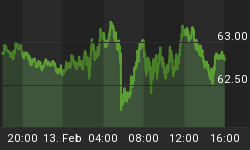Even a casual observer can see that the Fed is now caught between a rock and a hard place. If it lowers interest rates to head off the economic devastation that would come with a collapsed housing bubble -- housing is estimated to have, directly and indirectly, contributed 57% of U.S. economic activity over the past 5 years -- the Fed risks triggering a wholesale rush by foreigners to dump their trillions of U.S. dollars. But if it raises interest rates to protect the dollar, the Fed risks turning an economic downturn into the most serious recession since the 1930's.
It is our view at Casey Research that, for a number of reasons, not the least being that we are soon to enter the presidential election cycle, the government will take the course of inflation.
A couple of other factors lead us to that view. One is demographic.
The first-born baby boomers are turning 60 this year, and they and their little brothers and sisters will soon have their hands out for the Social Security and Medicare entitlements they've been promised. But the boomers represent an extraordinary bulge in the age profile of the U.S. population. The bulge means that the share of the population receiving government retirement benefits will grow, while the share of the population paying for them will shrink. To paper over this gross imbalance and still keep the entitlement checks going out, deficits will have to increase at a stupendous rate -- and the engine of monetary creation will have to ramp up to entirely new and increasingly dangerous levels.
The second factor promising more inflation is the "Forever War" against Islam -- already being called World War Three in many quarters. As the chart by our own Bud Conrad shows, the dollar has been a casualty of every U.S. war. War costs are paid for with deficits, and the deficits translate into rising price inflation every time.

Contrary to Wall Street's opinion, these aren't problems the Fed can sweep under the rug. Fed Chairman Bernanke is an academic with a reasonable understanding of the technical details, but his career bias has been to dodge recessions by cranking up the presses that print all those $100 bills. "Helicopter Ben" is the nickname he earned for facetiously proposing to drop cash out of helicopters to stave off a deflation.
Given the options in front of him, and his bias toward monetary expansion, we are convinced that the Fed will return to loose monetary policies -- masked by ongoing tampering with the CPI indicators and by obfuscating the truth about the money supply. That's the path of least resistance. In the short run, no one gets hurt, and it delivers the U.S. government its daily fix of billions needed to keep the ship of state afloat.
Monetary expansion will buy some time, but then the real trouble starts. A loose monetary policy eventually produces price inflation. As the inflation becomes noticed, foreign holders will lose confidence in the dollar. Then, as they head for the exit, the Fed will face a stark decision: either raise interest rates to economy-crushing levels to save the dollar, or let the dollar collapse and tolerate even worse inflation a little further down the line.
There's room in the Fed's lifeboat for the dollar, and there's room for the economy, but there isn't room for both. Bernanke has already all but announced that it will be the dollar that gets thrown overboard.
While no one can say how long it will take for a monetary crisis to emerge or what will ultimately trigger it, now is the time to acknowledge the risk -- and in fact the likelihood -- that it will occur in the next few years. That potential is confirmed with each newsflash telling us that the housing slump is accelerating and that signs of recession are appearing. Those are code words for the Fed to begin pumping more paper money into the system.
Don't put off preparing for what's coming. Start by salting away some physical gold and silver for wealth preservation -- precious metals being the only real form of money worth considering today. Then, for sheer profit potential, assemble a diversified collection of high-quality gold mining stocks such as we follow in the Casey Gold Stock Companion. We go for stocks that should out-perform gold bullion by a wide margin, to put the most profit into your pocket.
And remember, the time to rig for stormy weather is before the tempest hits, not in the middle of it. Buy your rigging now, while it's still cheap.
















